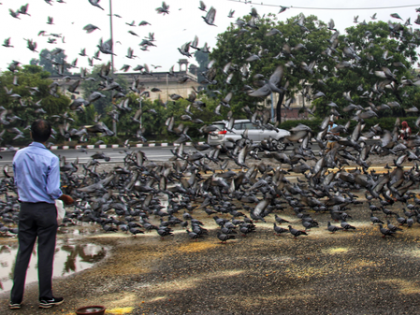Mumbai Kabutarkhana Row: HC Directs BMC to Seek Public Opinion Before Allowing Feeding Pigeons Again
By Lokmat Times Desk | Updated: August 13, 2025 18:30 IST2025-08-13T18:26:57+5:302025-08-13T18:30:14+5:30
The Brihanmumbai Municipal Corporation (BMC) informed the Bombay High Court on Wednesday that it is considering allowing regulated feeding ...

Mumbai Kabutarkhana Row: HC Directs BMC to Seek Public Opinion Before Allowing Feeding Pigeons Again
The Brihanmumbai Municipal Corporation (BMC) informed the Bombay High Court on Wednesday that it is considering allowing regulated feeding of pigeons at Dadar Kabutarkhana for a limited duration each morning, from 6 am to 8 am, under specific conditions, according to PTI. The move comes after widespread protests erupted when the BMC placed tarpaulin sheets over the popular pigeon-feeding site last week to prevent people from offering grains. The administration clarified that any controlled feeding would be implemented carefully, adhering to hygiene and public health norms, while balancing the long-standing cultural practice of feeding pigeons at the site.
However, a bench of Justices G S Kulkarni and Arif Doctor emphasized that before implementing any such plan, the BMC must first issue a public notice to seek objections from citizens. The court highlighted that the closure of kabutarkhanas and the prohibition of pigeon feeding was previously enacted in the interest of public health, and that rationale must remain intact. While hearing multiple petitions challenging the ban, the court instructed the civic body to consider public opinion before deciding on any controlled feeding at Dadar Kabutarkhana, a location frequented by devotees and residents for decades.
Also Read: Jalgaon Murder Case: Police Arrests Four For Killing 21-Year-Old Suleman Khan Abducted
During the hearing, BMC counsel Ram Apte reiterated that the corporation intends to allow feeding only in a restricted time slot under defined guidelines. The bench, however, questioned whether public consultation had been undertaken prior to considering this decision. The High Court stressed that the previous closure was enacted after weighing health concerns, and the civic body cannot reverse it without a well-considered process. Meanwhile, tarpaulin sheets remain a point of contention, as protestors had previously removed them, showing strong public attachment to feeding pigeons at the historic site in Dadar.
Separately, the Maharashtra government submitted a proposed list of 11 members for a scientific committee tasked with studying pigeon feeding at public spaces and its impact on human health. The High Court directed that the committee must be officially notified by 20 August. Advocate General Birendra Saraf stated that the panel will include representatives from public health, town planning departments, and medical experts. The committee’s findings are expected to inform future policy decisions on controlled feeding, balancing public health priorities with traditional practices cherished by local communities at the city’s kabutarkhanas.
The petitions challenging the BMC ban argue that the closure infringes on cultural practices, while the corporation cites public health risks from pigeon droppings and potential disease transmission. The High Court had earlier refused interim relief to petitioners but instructed the BMC not to demolish heritage pigeon-feeding structures. It also clarified that legal action could be initiated against individuals who violate the ban by feeding pigeons in public areas. The Supreme Court recently declined to intervene in the High Court’s ruling, maintaining the status quo on the closure of kabutarkhanas across Mumbai.
Senior counsel Anil Sakhare, representing the petitioners, indicated that if the BMC eventually approves controlled feeding, the petitioners may seek a revision of the previous order denying interim relief. He argued that a well-regulated approach could address public health concerns while allowing citizens to continue a cultural practice integral to the city’s identity. The BMC’s forthcoming decisions, coupled with the scientific committee’s report, are expected to shape a final policy that balances heritage, public sentiment, and health considerations at Dadar Kabutarkhana and other pigeon-feeding sites across Mumbai.
Open in app